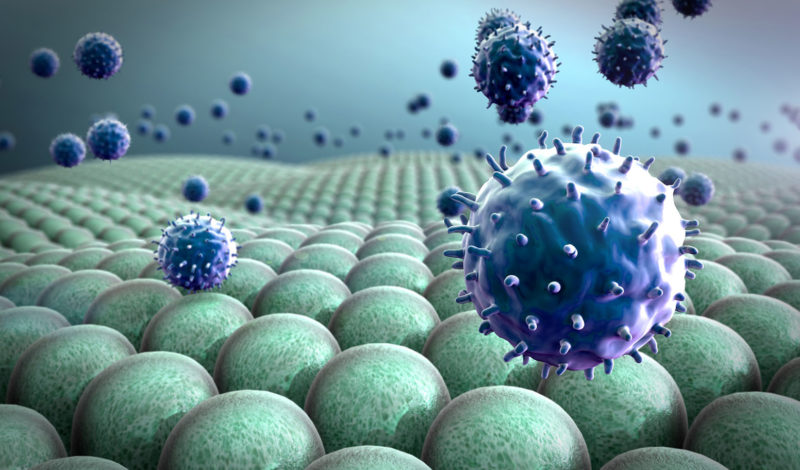"You are what you eat", "An apple a day keeps the doctor away", "Eat yourself healthy" – nutrition and the [...]

Immunodeficiency: When the immune system goes on strike
Actually the immune system is very resistant. However, it occasionally happens that it is unable to fight off pathogens that it could normally fend off without any problems. The reason for this is often immunodeficiency. But how does such an immune deficiency develop and what symptoms indicate a weak immune system? You can find the answers to these questions here.
Weak immune system: the biggest enemies of the immune system
There can be many reasons why the immune system is weakened. Congenital immunodeficiencies are relatively rare and are difficult to treat because they are genetically determined. Causal treatment is usually only possible in the form of stem cell therapy. Certain viruses can also lead to an irreversible weakening of the immune system – for example the HI virus. Most often, however, the immune system is simply weakened by an unhealthy lifestyle. People who suffer from a lot of stress, little sleep and a lack of nutrients strain their immune system. The same applies to environmental factors such as cold and wetness. It is not for nothing that the dreary autumn and winter months are considered the main cold season. However, such immunodeficiency is only temporary and can be prevented.
Another reason for a weakened immune system can be age. For example, babies’ and infants’ immune systems are not yet fully developed, which is why they have a higher risk of disease than adults. And older people also often suffer from a weak immune system. As an adult’s body produces fewer and fewer antibodies and immune cells over time, immunodeficiency becomes more common in old age.
Even pregnant women are often affected by a weak immune system. After all, the body not only needs additional energy for the development of the embryo, but also has to cope with a multitude of hormonal and physical changes within a very short time. This also challenges the immune system.
Therefore, the above-mentioned groups of people in particular should strengthen their immune system and do something for their immune system with a healthy and balanced diet, stress reduction and sufficient physical activity.
What indicates a weak immune system?
The symptoms of a weakened immune system can be just as diverse as the causes. Typical signs include constant tiredness and exhaustion as well as a high susceptibility to infections. In addition to classic cold symptoms such as sore throat, colds, fever and cough, the following symptoms can also indicate immunodeficiency:
- Herpes
- Gingivitis
- delayed wound healing
- Concentration disorders
- allergic reactions
- Hair loss and skin irritations
The problem of susceptibility to infection
Whether dry skin, stubborn herpes blisters or constant fatigue – every symptom of immunodeficiency makes life difficult for those affected. Due to the reduced ability to defend itself, the body is unable to fight pathogens such as bacteria, viruses, fungi and parasites adequately. As a result, these can penetrate the organism more easily and cause infectious diseases. Among the most common of such infections are
- Flu
- Colds
- Cystitis
- Gingivitis
- Diarrhoeal diseases
- Pneumonia
Two important allies: the immune system and the gut
The health of the intestines has a significant influence on the immune system. After all, more than two thirds of the body’s own defence cells and millions of microorganisms (intestinal bacteria) are located in your intestine. These not only ensure that your metabolism functions smoothly, but they are also of central importance for your immune system. On the one hand, the immune cells fend off pathogens, on the other hand, intestinal bacteria ensure that foreign, disease-causing cells cannot settle so easily.
Among the millions of intestinal bacteria there are both good and bad bacteria. Good bacterial strains such as lactobacilli and bifidobacteria play a decisive role in the digestion and metabolism of nutrients and also act as a barrier against pathogens. Bad, pathogenic bacteria, such as some E. coli strains, on the other hand, are a burden on the body. They can lead to serious diseases if the immune system is weakened. It is therefore extremely useful, especially for people with a weak immune system, to keep an eye on the bacterial balance of their intestinal flora and pay more attention to intestinal health.
Microbiota: Dealing with immunodeficiency through the intestine
If the bacterial balance in your intestine gets out of balance, this can lead to an immune deficiency. Pathogens then have an easy job of it. As a result, you will suffer more often from colds, flu-like infections or even cystitis or gingivitis.
If such signs of a weak immune system accumulate, it may therefore be advisable to have the microbiota of your intestinal flora examined.
- Sources:
- Janeway CA, Travers P, Walport M, Shlomchik M. (2005) Immunology. New York. Garland Science
- Steinmüller, Dr. Rolf. „Escherichia coli“. Ernährungsumschau, Bd. Ernährungs Umschau, Nr. 7/10, 2010, S. B13–28, www.ernaehrungs-umschau.de/fileadmin/Ernaehrungs-Umschau/pdfs/pdf_2010/07_10/EU07_2010_B25_B28.qxd.pdf.
- Sartor RB. (2008) Microbial influences in inflammatory bowel diseases. Gastroenterology. 134(2):577-94. doi: 10.1053/j.gastro.2007.11.059
- Quigley E. (2019). Prebiotics and Probiotics in Digestive Health. Clinical gastroenterology and hepatology : the official clinical practice journal of the American Gastroenterological Association, 17(2), 333–344. Doi: 10.1016/j.cgh.2018.09.028
- Meckel, K. R., & Kiraly, D. D. (2019). A potential role for the gut microbiome in substance use disorders. Psychopharmacology, 236(5), 1513–1530. doi: 10.1007/s00213-019-05232-0
- Immunsystem stärken gegen Erkältungen | Apotheken-Umschau




